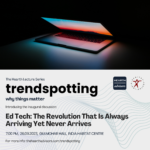26 September 2023 (Tuesday), 7pm
Gulmohar Hall, India Habitat Centre, New Delhi
“Ed-Tech: The Revolution That Is Always Arriving Yet Never Arrives”
Ignoring the growing number of ed-tech start-ups that have faltered is nearly impossible. India is ed-tech’s second-largest market globally, and the middle class is drawn in by the allure of a new, technologically-driven education that replaces an ‘obsolete’ traditional education system. However, the critical question arises: Is ed-tech a thoroughly evaluated and impactful method of learning, or is it merely a well-oiled marketing machine that perpetually defers the dreams of ambitious parents to the next big invention? The panellists embark on a journey to explore and dissect the enduring promise that ed-tech is on a mission to replace traditional education as we know it.
Panellists:
Shikhar Malhotra (Trustee, Shiv Nadar Foundation, Director, HCL Tech, Chairman, Shiv Nadar Schools & Chancellor Shiv Nadar University IOE)
Sabina Dewan (President, JustJobs Network)
Dr Anupama Mallik (CEO and Managing Director, Vizara Technologies, an IIT Delhi startup)
Dr Jagjit Kaur (Postdoctoral fellow at the Centre for Digitisation, AI and Society, Ashoka University)
Moderator:
Shashank Vira (Managing Partner, Hearth Advisors, & Global Advisor to Cambridge University’s Digital Education Futures Initiative)
Summary of Discussions
The inaugural lecture of “Trendspotting: Why Things Matter” focused on ed-tech and its impact on the evolution of education and work. Moderated by Mr. Shashank Vira, the discussion featured a panel of thinkers, investors, educators, and innovators, all of whom had their expertise closely tied to ed-tech or had dedicated significant time to pondering ed-tech’s implications.
The discussion was guided by a straightforward question: “What is the problem in education or research that [Ed-tech and] AI are in a unique place to solve?” Shikhar Malhotra, a business leader and ed-tech investor, opened the discussion with the claim that the ‘over-marketing’ of ed-tech had led to a myopic impression that the industry focused purely on content creation and dissemination. Shikhar insisted that ed-tech warranted more intrigue than scepticism as, over the years, he had encountered numerous fascinating ed-tech innovations that focused not just on content but also on analytics, teacher enabling, and remote learning – features that he believes make ed-tech the invention that it is touted to be. Shikhar also noted that ed-tech’s value appears to grow when targeting older learners. For instance, Babson University received eight times the usual number of applications once they offered their master’s programme online as people chose to eschew an on-campus experience for a similar education at a lower price point that didn’t disrupt their ability to work or stay with their families. Shikhar also shared with the audience the wondrous ways in which John Hopkins University used incredibly sophisticated and detailed simulations to train surgeons in one of the world’s top-rated medical schools.
Dr. Anupama Mallik, an expert on Artificial Intelligence who runs her own ed-tech start-up that uses AR and VR to bring India’s heritage to the classroom, believes AI is uniquely positioned to enhance employment and employability by reverse-engineering the employment process. She stated that AI could be used to tailor and adapt teaching and learning modules to the ever-changing needs of evolving industries. Finally, in her concluding remarks, Anupama emphasised the need to highlight ed-tech’s potential beyond corporate marketing, urging those with practical experience to lead the way.
Meanwhile, Sabina Dewan, the CEO and Founder of the JustJobs Network, did not seem quite as bullish on using ed-tech, particularly in a country like India. While she acknowledged the varied use cases of ed-tech and AI in education, Sabina brought some staggering statistics to depict why ed-tech may not be the silver bullet envisioned, particularly in India. She highlighted the fact that only 26% of Indian women owned a smartphone, and only 14% were connected to the internet. In her opinion, an over-reliance on ed-tech would only exacerbate India’s unequal access to quality education. Moreover, Sabina challenged the idea that technology alone could address learning loss and stressed the importance of a strong human interface in education through what she called an ‘assisted technology’ approach.
Dr. Jagjit Kaur a Postdoctoral Scholar at the Centre for Digitisation, AI and Society at Ashoka University, insisted that unleashing the genie of ed-tech without regulation and a clear understanding of its purpose, was impulsive, and driven by unbridled excitement regarding AI and technology, reminiscent of the excitement that had gripped developed Western nations during an economic depression in the 1970s and 1980s. Jagjit was also wary that ed-tech in the classroom was merely a tool for providing students with momentary excitement, not true learning and was changing the stakeholders of learning by placing technology at the centre of what should be a relationship between a teacher and a student. Jagjit ended with a cautionary note, reminding us that while technology has valuable educational uses, it should not be the sole focus of innovation. Over-reliance on machines could lead to potential psychological and social consequences.
The length and breadth of the discussion revealed the complexity of the ed-tech and AI landscape. They emphasised the need for thoughtful consideration and balanced approaches in shaping the future of education. The panellists’ views left the audience with thought-provoking insights to guide their decisions before investing their time or money in education technology and AI.
Background
The United Nations Human Rights Council Special Rapporteur on the right to education urged the global community to frame digital technology around every person’s human right to public, free, quality education (April 2022). The realm of education has been inundated with promises of transformative change through integrating educational technology, or ‘Ed Tech’. As we navigate the unprecedented acceleration in technology and as countries endeavour to identify the optimal entry and investment points in Ed Tech to leapfrog over continuing challenges to respective national education systems, questions abound regarding its appropriateness, relevance, and cost-benefit. Has Ed Tech lived up to the hype, or is the long-awaited technological breakthrough still around the corner, as always, almost attainable but not quite there? The significance of equipping learners with technological skills to thrive in a world propelled by an excessive rapidity of social change cannot be overstated. However, there is a distinction between learning technology and learning through technology. What concrete and unbiased evidence supports the notion that learning through technology is imperative for students? What educational challenges are we striving to address, and is Ed-Tech the ideal tool for solving these challenges?
The Ed-Tech landscape underwent a seismic shift due to the pandemic, bringing it to the forefront of global and national education policy discourses. Was this an emergency necessitated makeshift, or would traditional educational methods and the role of educators never be the same again? Despite the proliferation of remote learning, the pandemic exposed staggering learning losses and a decline in the socio-emotional well-being of students. This raises critical questions about Ed-Tech’s promise of democratising and personalising education.
In this comprehensive exploration of Ed Tech, our panellists endeavour to shed light on these multifaceted questions, aiming to unravel the paradoxes surrounding technology integration in education and raise questions for our audience to reflect on a more informed path forward.








